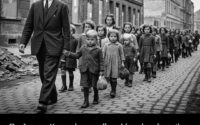The Fateful Train: The Tragedy of a Polish Mother and Her Two Daughters at Auschwitz. .m
The Lasting Scars of War
Fanny Cukier, a Polish Jew, emigrated to France in search of a new, safer life. But then, in August 1942, she and her two daughters, Ginette and Irene, were deported from France to the infamous concentration camp Auschwitz, where, after a quick “screening,” all three were murdered in the gas chambers.
Fanny’s story is not unique. Millions of Jews suffered similar tragedies during the Holocaust. But hers is particularly significant: it demonstrates the brutality of the Nazis against women and children. It is a heartbreaking reminder of how war spares no one, and how it destroys the most sacred of all: motherhood.
From Hope to Despair
Fanny Cukier left Poland with the hope of a brighter future in France. She overcame many hardships to raise her two daughters. But then, all that hope was cruelly crushed when she and her children were put on a train.
Fanny Cukier’s story raises difficult questions: What can we do to protect the innocent? What can we learn from these tragedies to prevent similar crimes in the future?
Justice Beyond Time
Despite the crimes that occurred decades ago, justice is still a burning issue. Hundreds of former Nazi soldiers and prison guards are still wanted and tried. Because, for crimes against humanity, there is no such thing as “too late”.
The sacrifice of Fanny Cukier and her daughters was not in vain. Their story has become a symbol of brutality, but also a reminder of resilience and courage. It is also a strong call for us to never forget what happened, and to never stop fighting for justice and peace.


